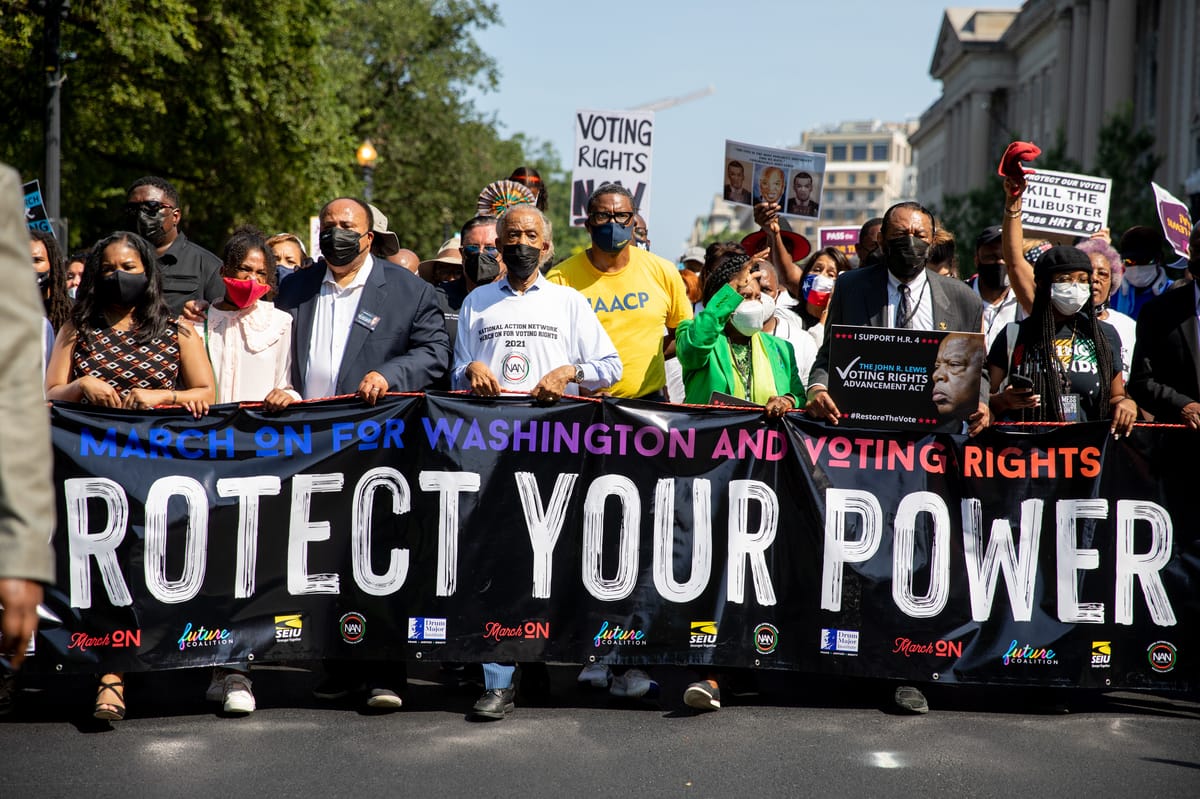Civil Rights Orgs Blast Big Tech's "Get-of-Jail-Free" Card, VT Kids Code Becomes Law

Welcome back to The Dispatch from The Tech Oversight Project, your weekly updates on all things tech accountability. Follow us on Twitter at @Tech_Oversight and @techoversight.bsky.social on Bluesky.

🏛️ CIVIL RIGHTS ORGS BLAST BIG TECH’S “GET OUT OF JAIL FREE” CARD: Late last week, the Leadership Conference on Civil and Human Rights, led 30 civil rights groups including the NAACP, Color of Change, National Action Network, and UnidosUS, in urging the Senate to strip a sweeping AI provision from the budget bill that they say goes too far.
In their letter, the organizations blast the 10-year moratorium on state and local AI regulation – making the case that it would undermine civil rights protections, especially for Black, Latino, disabled, and other marginalized communities already harmed by automated systems. The letter calls it “a 10-year ‘get out of jail free’ card” that would leave people “vulnerable and exposed to faulty technology.” Laws in states like Colorado, Washington, and Virginia targeting discriminatory facial recognition and political manipulation would be nullified.
“The latest version of the moratorium, which forces states to choose between regulating AI and receiving broadband funding, presents a false choice that no member of Congress should accept,” the letter states. It criticizes efforts to “use broadband funding as a bargaining chip” to suppress state protections.
The consequences are not abstract. Black residents in Detroit have been wrongfully arrested by faulty facial recognition. AI tools have excluded qualified Black and Latino renters, and disabled people have lost public benefits due to flawed eligibility systems. “Preempting regulation for a decade will allow unchecked harm to proliferate,” the letter warns.
While some say it is likely that the Big Tech handout will be dropped under the Senate’s Byrd Rule, that doesn’t mean that the fight is over. In fact, Senator Ted Cruz has already gone on record saying he will introduce a standalone version if Congressional Republicans are unsuccessful in attaching it to the Budget Reconciliation bill.
Importantly, the coalition letter from civil rights organizations also urges Congress to not just remove the provision from reconciliation, they want Congressional leaders to reject any future attempt to enshrine tech immunity at the expense of civil rights.

🗳️ DEMOCRACY IS TAKING THE FIGHT TO BIG TECH: Last week, Rep. Mikie Sherrill won the Democratic nomination for New Jersey governor on Tuesday, securing roughly 34% of the vote in a crowded primary field. Sherrill made tech accountability and online safety a key focus of her campaign, especially when it comes to protecting kids.
Sherrill’s online safety and tech policy agenda focuses on tightening industry accountability and protecting children from algorithmic harms. Her proposals include:
- Enacting an Age-Appropriate Design Code to prioritize the safety, health, and privacy of users under 16, ban targeted ads to kids, and restrict manipulative design tactics.
- Requiring warning labels on social media about mental health risks to adolescents, echoing recommendations from the former U.S. Surgeon General and 42 bipartisan state attorneys general.
- Holding platforms liable for amplifying extremist content and enabling serious harm to children.
- Requiring transparency around how algorithms rank and promote content.
In her victory speech, Sherrill said she would “take on systems that don’t work” — a message consistent with her focus on reining in tech industry practices that have gone largely unchecked at the state level.

- Meta CEO Mark Zuckerberg: 74% disapprove (–59)
- Amazon Executive Chairman Jeff Bezos: 67% (–45)
- Google CEO Sundar Pichai: 55% (–38)
- OpenAI CEO Sam Altman: 50% (–36)
- Apple CEO Tim Cook: 44% (–14)
Source: TOP/PPP Poll, June 2025

📉 BAD NUMBERS FOR BIG TECH CEOs: A new national survey from The Tech Oversight Project and Public Policy Polling finds that voters across the political spectrum overwhelmingly distrust Big Tech CEOs and reject the idea that these executives should have any role in shaping public policy. (See above)
Tellingly, just 7% of voters say they trust Big Tech CEOs to make policy decisions that affect them.
Support for accountability is broad and bipartisan. 72% of voters support a Big Tech tax, including 86% of Democrats, 70% of Independents, and 60% of Republicans. Voters want tech companies to pay their share and face real oversight.
Even as some executives have attempted to align themselves with Donald Trump and his orbit, voters remain skeptical. A majority, including 54% of Trump voters, see those moves as performative. As Sacha Haworth, Executive Director for The Tech Oversight Project, told the New York Post: “Voters see through Big Tech’s last-ditch attempts to launder their reputations.”

🌲🥾 EVERGREEN STATE WIN: The Vermont Kids Code is officially law! This is a major win for us as tech accountability advocates – and a signal of how far the conversation has come on kids online safety. As Sacha pointed out: “Just last year, Governor Phil Scott vetoed the Vermont Kids Code. This year, he signed it into law – proof that calls for accountability for Big Tech on kids’ safety have become too powerful to ignore.”
The bill’s passage came despite fierce opposition from industry groups and national tech lobbyists, who tried to derail the effort as they have in other states. Advocates say Vermont’s success offers a clear model for state-level leadership at a moment when federal action on tech reform remains stalled.
Vermont’s Age-Appropriate Design Code (S.69) will ban targeted advertising to minors, restricts the collection and sale of kids’ data, and prohibits the use of manipulative design features like “dark patterns” that nudge users toward sharing more than they intend. Crucially, Vermont’s Kids Code is the first in the country to include a private right of action for families – a major step forward building on the efforts in California, Maryland, and Nebraska.

As the California legislature hits a key deadline, we’re seeing strong momentum behind tech accountability bills. At Tech Oversight California, we’re backing measures to rein in Big Tech’s worst practices – algorithmic targeting, surveillance profiteering, and exploitative design targeting kids.
Advancing bills include stronger enforcement powers for the attorney general, algorithmic transparency, and a ban on manipulative design tricks that keep kids hooked. Together, these bills would set a new high-water mark for tech regulation.
But as we warned last week, Big Tech lobbying is ramping up. Google spent nearly $11 million in Sacramento last year – more than the previous 20 years combined. This is when the industry lobby floods the Capitol using every trick in the book to derail and water down reform.
As our press call last week highlighted, location data privacy is more important than ever for California lawmakers to ensure. After protests against ICE raids in LA, Trump’s pick for U.S. attorney in Los Angeles, Bill Essayli, told Fox LA his office will review “every piece of video and social media” to track protesters. “The FBI is monitoring everything,” he said. “We will come get you.”
Californians deserve safety, privacy, and protections that aren’t up for sale. These next few weeks offer an opportunity for lawmakers in Sacramento to stand up and deliver policy reforms that address Big Tech’s toxic business model.

